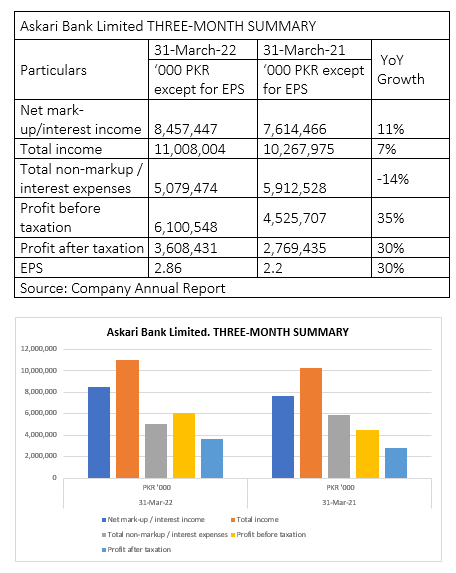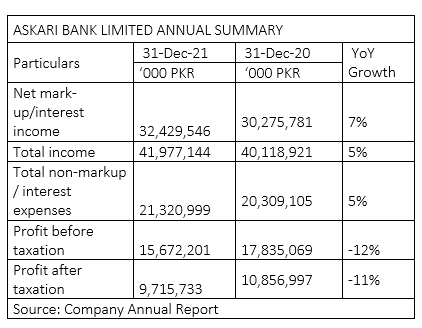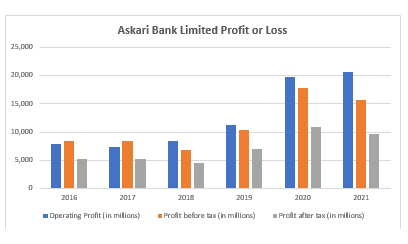INP-WealthPk
Hifsa Raja
The imposition of hefty tax on corporate earnings has impacted the balance sheets of businesses with many of them running in losses.
This was stated by Muhammad Qasar, the Manager Operations of Askari Bank Limited, during an interview with WealthPK.
Here are the details:
Q: How has your bank fared amid turmoil in financial markets?
A: The bank has strong reserve foundation unlike other banks. Moreover, the State Bank of Pakistan’s measures have helped insulate the cooperate sector from the economic stress. The central bank has also extended loan facilities to the banks to help them avoid any financial stress and keep paying their employees instead of laying them off.
Q: How does fluctuation in exchange rate affect your company, and what steps is the bank taking to overcome its effects?
A: Due to the bank's exposure to foreign exchange, there is a risk that the bank's capital or earnings will fluctuate as a result of fluctuations in exchange rate.
The bank’s treasury wing controls foreign exchange risk by matching spot and forward liabilities and assets in foreign currencies. Value at Risk (VaR) is determined for the foreign exchange exposure on a daily basis, and the foreign exchange exposure is kept within legal limitations. Through daily sensitivity analysis, the effect of a change in the dollar-rupee parity is also calculated.
Q: How has your bank progressed of late as far as earnings are concerned?
A: Askari Bank posted an operating profit of Rs20.5 billion in 2021, which was marginally higher than Rs19.7 billion a year earlier. The bank’s profit-after-tax stood at Rs9.7 billion compared to Rs10.8 billion previously, posting a 10.2% decline year-on-year mainly due to higher provisions against non-performing assets. The net provision requirement increased to Rs4.9 billion as against Rs1.9 billion. The earnings per share (EPS) for 2021 was Rs7.70, compared to Rs8.57 for the previous year.
Q: What steps is SBP taking to keep inflation in check?
A: Inflation affects the banks as the cost of everything rises. The SBP has enforced regulatory measures, including increasing its policy rate, enforcing a higher cash reserve requirement, and regulatory tightening of consumer finance to combat inflationary pressure and ensure sustainable growth.
Q: What is the liquidity risk? And how is the bank tackling it?
A: Liquidity risk is a company's inability to secure funding to fulfill obligations. The Asset and Liability Management Committee (ALCO) oversees the bank's liquidity position. ALCO analyses the preservation of financial position, liquidity ratios, and depositor concentration. The bank is certain that the current liquidity buffer will be enough to cover any negative changes to the cash flow maturity profile.
Q: Why are the quarterly reports showing a loss in the financial statements of different banks?
A: The main reason is imposition of the super tax on the earnings of the corporate sector. The companies’ after-tax profits are being squeezed and business are going in losses.
Company’s profile
Askari Bank Limited operates commercial and retail banks, providing banking solutions.
The bank's deposit products include Value Plus Current Account, Askari Asaan Account, Little Champs Account, Askari Waqaar Account, Askari Maximiser Account, PakWatan Remittance Account, Askari One Year Term Deposit for individuals. It also provides corporate and investment banking, commercial banking, and agriculture banking services for businesses.
Financial Performance
Askari Bank Limited’s net markup climbed 11% to Rs8.45 billion in the first three months of the previous fiscal year 2021-22 (3MFY22) from Rs7.61 billion over the corresponding period of FY21.
The total income, showing a 7% growth, stood at Rs11 billion in 3MFY22 compared to Rs10 billion over the same period of FY21.
The interest expenses stood at Rs5.07 billion, down by 14%, from Rs5.91 billion in 3MFY21.
The before-tax profit showed a growth of 35% and reached Rs6.10 billion in 3MFY22 from Rs4.52 billion in 3MFY21.
The profit-after-tax showed a growth of 30% and reached Rs3.60 billion in 3MFY22 from Rs2.76 billion in 9MFY21.
The EPS stood at Rs2.86 in 3MFY22 compared to Rs2.2 over the same period in FY21, showing a growth of 30%, reports WealthPK.

Annual Summary:
During the fiscal year 2020-21, the company generated net markup of Rs32 billion over Rs30 billion in 2019-20, registering an increase of 7%.
The total income for FY21 was Rs41 billion, up 5% from Rs40 billion in FY20.
The interest expense for FY21, showing an increase of 5%, settled at Rs21 billion compared to Rs20 billion in FY20.
The profit-before-tax for FY21 was Rs15 billion compared to Rs17 billion in FY20, showing a decrease of 12%.
Similarly, the profit-after-tax for FY21 was Rs9.7 billion as compared to a loss of Rs10.8 billion in FY20, showing a decrease of 11%.

Profit or loss over the years

The company’s profitability – operating profit and profit before and after tax – remained low in 2018, but all three ratios showed a constant increase afterward. The profitability improved significantly in 2020 and 2021, as the operating profit ratio and profit before and after tax increased at a good pace.
Credit : Independent News Pakistan-WealthPk













